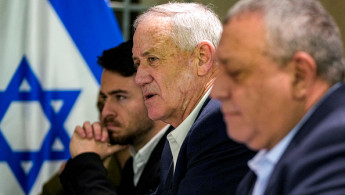Netanyahu’s post-war Gaza plans revealed: Full demilitarisation, shutting down UNRWA
Israel Prime Minister Benjamin Netanyahu revealed plans for a post-war Gaza to his war cabinet for the first time late Thursday, which includes the 'demilitarisation' of the enclave, control over Palestinian territories and closing aid agency UNRWA.
The plan has been slammed by Hamas and others who view it as direct Israeli occupation of Gaza and an infringement of Palestinian sovereignty.
Netanyahu had previously cancelled war cabinet discussions on day-after plans for Gaza, leading to "significant pressure" from coalition partners and international leaders.
A senior Netanyahu aide said that the document could be subject to further alterations before its approval by the war cabinet following discussions with other members of the body.
So far, it includes the unchanged short-term goals of the military campaign in Gaza, such as dismantling Hamas and Islamic Jihad and securing the release of the captives.
However, Netanyahu's main points for his medium-term plan for Gaza post-war consist of maintaining its ability to conduct military operations inside Gaza and establishing a buffer zone along the border.
It also aims to tackle smuggling on the Egypt -Israel border along with the Rafah crossing.
There are also plans for civil affairs in Gaza to be run by "local officials with administrative experience", who are "not linked to countries or entities that support terrorism", The Times of Israel reported.
Israel’s Channel 12 TV reported on Thursday that the Zeitoun neighbourhood of Gaza City was a candidate as a pilot for the rollout of the plan, which could see local merchants and civil society leaders distribute humanitarian aid.
Senior Hamas official Sami Abu Zuhri said the plan would be tantamount to Israel reoccupying Gaza, following its withdrawal of troops and settlers in 2005.
The plan additionally envisages Gaza's "complete demilitarisation... beyond what is required for the needs of maintaining public order".
It aims to promote "de-radicalisation in all religious, educational and welfare institutions in Gaza".
Another key element of the plan was the dismantling of the UN agency for Palestinian refugees, UNRWA, the report said.
Israel has alleged that several employees of UNRWA took part in the October 7 attack on Israel that resulted in the deaths of about 1,160 people, according to Israeli figures.
The UN sacked the employees accused by Israel and has begun an internal probe of the agency.
Since the Israeli allegations emerged several countries have suspended their funding to the agency.
The spokesman for Palestinian President Mahmoud Abbas, Nabil Abu Rudeineh, told Reuters that Netanyahu's proposal was doomed to fail, as were any Israeli plans to change the geographic and demographic realities in Gaza.
"If the world is genuinely interested in having security and stability in the region, it must end Israel's occupation of Palestinian land and recognise an independent Palestinian state with Jerusalem as its capital," he said.
“#Netanyahu's proposed plans aim to perpetuate #Israel's occupation of #Palestinian territories & prevent the establishment of a Palestinian state”-Nabil Abu Rudeineh, spokesman for President Abbas, responds to Netanyahu’s post-war #Gaza plan pic.twitter.com/C1Q5aKadBX
— sebastian usher (@sebusher) February 23, 2024
Some elements of the reported Netanyahu plan conflict with Washington's vision for post-war Gaza, which is officially aligned to a two-state solution.
The US has backed Netanyahu's call to eradicate Hamas, which controls Gaza, but has called for the Palestinian Authority, led by Mahmoud Abbas in the occupied West Bank, gradually to take over control in Gaza.
However, a number of senior Israeli politicians oppose this.
Netanyahu himself has long denounced the Palestinian Authority, and on Wednesday Israel's parliament also backed another proposal opposing any unilateral recognition of a Palestinian state.
Multiple news agencies, including Reuters, have also contributed to the report.





 Follow the Middle East's top stories in English at The New Arab on Google News
Follow the Middle East's top stories in English at The New Arab on Google News

![MP Essam Diab's pursuit to block TikTok in Egypt has revived an already ongoing debate in the country. [Getty]](/sites/default/files/styles/image_330x185/public/1230748046.jpeg?h=a5f2f23a&itok=-8MqBLLC)
